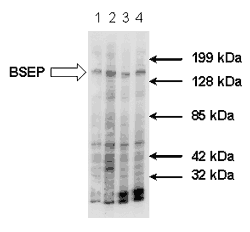Product Details
| Alternative Name: | Bile salt export pump, SPGP, Sister of P-glycoprotein, ABCB11 |
| |
| Clone: | USal-hBSEP-McAb-1 |
| |
| Host: | Mouse |
| |
| Isotype: | IgG1 |
| |
| Immunogen: | Synthetic peptide corresponding to aa 705-718 (Y705LVHEPPLAVVDHK718) of human BSEP (bile salt export pump). |
| |
| UniProt ID: | O95342 |
| |
| Species reactivity: | Human
|
| |
| Applications: | ICC, WB
|
| |
| Recommended Dilutions/Conditions: | Western Blot (1:50-1:200)
Suggested dilutions/conditions may not be available for all applications.
Optimal conditions must be determined individually for each application. |
| |
| Application Notes: | Immunocytochemistry: cytospin preparations
Not suitable for IHC. |
| |
| Purity Detail: | Protein G-affinity purified. |
| |
| Formulation: | Liquid. Contains 100nM sodium azide and 0.7% BSA. |
| |
| Handling: | Avoid freeze/thaw cycles. After opening, prepare aliquots and store at -20°C. |
| |
| Shipping: | Blue Ice |
| |
| Short Term Storage: | +4°C |
| |
| Long Term Storage: | -20°C |
| |
| Scientific Background: | Bile Salts
Bile salts are important physiological agents that serve a number of functions, including absorption, solubilization, transport and secretion of lipids. In the liver, they participate in the generation of bile flow and the secretion of cholesterol and phospholipids, such as phosphatidylcholine. When released into the intestine, they facilitate the uptake of cholesterol, fat-soluble vitamins and other lipids. Moreover, the biosynthesis of bile acids from cholesterol is the most significant pathway for the elimination of cholesterol from the body. However, because of their detergent properties, bile acids are inherently cytotoxic and disruptions in their normal transport or secretion can result in a variety of pathophysiological conditions.
BSEP
Bile formation is an important function of the liver. It is mediated by hepatocytes which generate bile flow within the bile canaliculi by continuous vectorial secretion of bile salts and other solutes across their canalicular (apical) membrane. Bile secretion is mediated by several ATP-binding cassette (ABC) transporters located in the canalicular membrane of hepatocytes. Among these ABC transporters, the bile salt export pump (BSEP or ABCB11) represents the primary, if not sole transport system for the canalicular excretion of bile salts. Bile secretory failure results in cholestasis and progressive familial intrahepatic cholestasis (PFIC) in infancy represents a group of inherited cholestatic diseases that are classified into three subtypes. One of these subtypes, PFIC II, is associated with mutations in the BSEP gene. PFIC patients with mutations in the BSEP gene have normal γ-glutamyltransferase activity, low concentrations of bile salts in bile, and an absence of bile duct proliferation. Additionally, human obesity is associated with altered cholesterol homeostasis including increased production and turnover, as well as secretion of excess cholesterol from the liver into bile.
BSEP is a multifunctional polypeptide with two homologous halves, each containing a hydrophobic membrane-ancoring domain and an ATP-binding cassette (ABC) domain. The membrane-anchoring domain is composed of six helixes buried in the lipid bilayer of the plasma membrane and the ATP binding ABCs are exposed to the cytosol. The membrane-anchoring domain helixes are thought to form channels spanning the plasma membrane.
|
| |
| Regulatory Status: | RUO - Research Use Only |
| |

Figure: Western blot analysis using MAb to BSEP (human) (USal-hBSEP-McAb-1) (Prod. No.
ALX-801-035) (Lot L17660).
Method: Conditions of the assay carried out using crude plasma membranes purified from human liver tissue samples collected by fine needle biopsy; Amount of proteins loaded: 40µg; Dilutions: lane 1: 1/200; lane 2: 1/150; lane 3: 1/100; lane 4: 1/50."
Please mouse over
Product Literature References
Expression in Human Trophoblast and Choriocarcinoma Cell Lines, BeWo, Jeg-3 and JAr of Genes Involved in the Hepatobiliary-like Excretory Function of the Placenta: M.A. Serrano, et al.; Placenta
28, 107 (2007),
Abstract;










